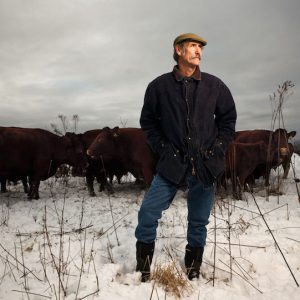Ep. 49: Karen Karp – CEO & founder of KK&P ||
Karen Karp is a fourth-generation food entrepreneur. Her great grandfather Morris, a first generation immigrant from Ukraine, opened a butter, eggs, and cheese wholesale outlet on Manhattan’s far west side, and later a feed and seed company on Coney Island Avenue in Brooklyn. Karen’s father served the farmers of Long Island’s East End as a real estate broker concentrating on industrial and agricultural properties, and brokered the country’s first Transfer of Development Rights deal in the 1970s. This stuff and that area are in her blood. Karen Karp is now leveraging her diverse background in food and its production, in public health, and within investment communities in The City to empower more young women to assess things differently; to take more control of their own destinies.
.
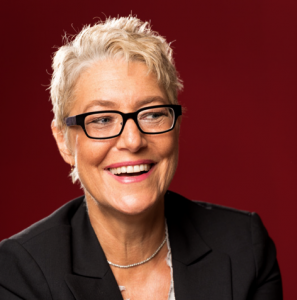 For episode 49 of Sourcing Matters we focus on Karp’s recent project – “Investigating the Role of Women, Capital, and the Transformation of Food and Agriculture.” Co-chaired by leadership at AgFunder and ‘The New Food Economy’, this analysis sets to find some answers to timely and important questions that we all need to pay more attention to. As sons, husbands, brothers & fathers – we all need to pay better attention too. Since establishing Karen Karp & Partners in 1990 she’s focused efforts on developing a range of bespoke strategies that explore the interconnections between agriculture, food, policy and people, and how to marry common interests of the for-profit and nonprofit sectors. KK&P has grown to become a nationally respected boutique consultancy with a uniquely skilled staff and a diverse roster of clients – including nearly a decade co-producing the James Beard Foundation conference.
For episode 49 of Sourcing Matters we focus on Karp’s recent project – “Investigating the Role of Women, Capital, and the Transformation of Food and Agriculture.” Co-chaired by leadership at AgFunder and ‘The New Food Economy’, this analysis sets to find some answers to timely and important questions that we all need to pay more attention to. As sons, husbands, brothers & fathers – we all need to pay better attention too. Since establishing Karen Karp & Partners in 1990 she’s focused efforts on developing a range of bespoke strategies that explore the interconnections between agriculture, food, policy and people, and how to marry common interests of the for-profit and nonprofit sectors. KK&P has grown to become a nationally respected boutique consultancy with a uniquely skilled staff and a diverse roster of clients – including nearly a decade co-producing the James Beard Foundation conference.
.
Karen and her team are equally adept in the boardroom, in the kitchen, or on the land – their systems-based approach is always both conceptually rigorous and grounded in practical understanding. Have a listen to our discussion about finding gender equality in innovation economies; at the workplace; at home; within food and its production.
.


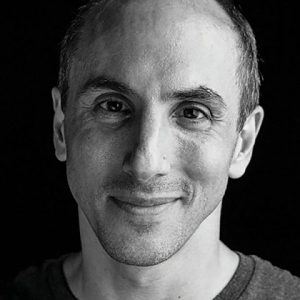 After working alongside some of the world’s best chefs at Square One, Le Cirque, and La Bernadin – Michael Leviton returned to his hometown of Newton, Massachusetts in 1999 to open Lumière. In Lumière’s first two years in business, the restaurant was recognized as one of the Best New Restaurants in America by Bon Appétit, and Michael was named a Best New Chef by Food & Wine. In 2011, Leviton opened Area Four, a wood-burning oven/bar and attached coffeehouse/bakery. Modern and minimalistic in both menu and design, each property earned local and national recognition for serving highest quality product, sourced locally and all scratch made, at a price point and in a setting that is accessible to all.
After working alongside some of the world’s best chefs at Square One, Le Cirque, and La Bernadin – Michael Leviton returned to his hometown of Newton, Massachusetts in 1999 to open Lumière. In Lumière’s first two years in business, the restaurant was recognized as one of the Best New Restaurants in America by Bon Appétit, and Michael was named a Best New Chef by Food & Wine. In 2011, Leviton opened Area Four, a wood-burning oven/bar and attached coffeehouse/bakery. Modern and minimalistic in both menu and design, each property earned local and national recognition for serving highest quality product, sourced locally and all scratch made, at a price point and in a setting that is accessible to all.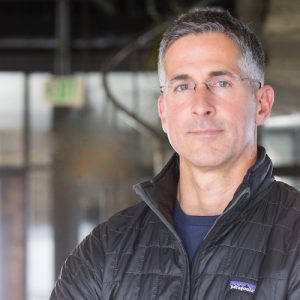 Prior to Thrive, McIntosh was the founding Director of Sustainability & Corporate Citizenship at Nestlé Waters North America, the $4B division of the world’s largest consumer water company. At Nestlé Waters, Alex developed the vision and strategic plan, and provided hands-on leadership to build the corporation’s first sustainability program from the ground up during a time of intense social scrutiny. Prior to Nestlé, Alex was Director of Philanthropy at The Nature Conservancy, where he helped raise a record $75MM in private capital for two of the largest watershed conservation projects in the organization’s history.
Prior to Thrive, McIntosh was the founding Director of Sustainability & Corporate Citizenship at Nestlé Waters North America, the $4B division of the world’s largest consumer water company. At Nestlé Waters, Alex developed the vision and strategic plan, and provided hands-on leadership to build the corporation’s first sustainability program from the ground up during a time of intense social scrutiny. Prior to Nestlé, Alex was Director of Philanthropy at The Nature Conservancy, where he helped raise a record $75MM in private capital for two of the largest watershed conservation projects in the organization’s history.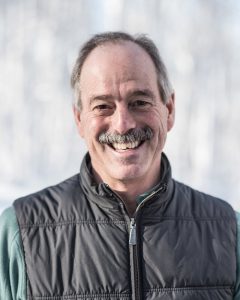 They’re surely good eating, but oysters represent so much good to their surrounds, the shared environments, and the communities they support. You see, each adult oyster filters 50 gallons of water daily, they restore keystone marine ecosystems, and they build protective reefs around susceptible coastal communities – protecting us from storm surge and severe weather events. In this 45 minute discussion Bill Mook goes into details describing why Oysters are so important to the stability of seas, and to our planet. As you’ll hear, Mook has implemented bleeding-edge R&D in his hatchery that is second to none. Innovations include development of methods for overwintering seed out of the water; a tidal powered nursery system; a vessel and gear for mechanizing the use of OysterGro™ cages; and a unique, energy efficient, and highly productive system for growing the micro-algae we use for food in the hatchery. Effectively his approach to “brew” feed for Oysters, or for other animals for that matter, sets to be revolutionary.
They’re surely good eating, but oysters represent so much good to their surrounds, the shared environments, and the communities they support. You see, each adult oyster filters 50 gallons of water daily, they restore keystone marine ecosystems, and they build protective reefs around susceptible coastal communities – protecting us from storm surge and severe weather events. In this 45 minute discussion Bill Mook goes into details describing why Oysters are so important to the stability of seas, and to our planet. As you’ll hear, Mook has implemented bleeding-edge R&D in his hatchery that is second to none. Innovations include development of methods for overwintering seed out of the water; a tidal powered nursery system; a vessel and gear for mechanizing the use of OysterGro™ cages; and a unique, energy efficient, and highly productive system for growing the micro-algae we use for food in the hatchery. Effectively his approach to “brew” feed for Oysters, or for other animals for that matter, sets to be revolutionary.
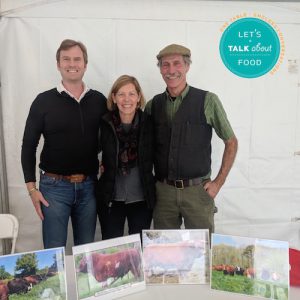 Sourcing Matters ep. 41: “Systems Thinking in food production”– live recorded at the “Let’s talk about Food” festival at Harvard University – looks at harmonizing with more natural systems, and evaluates better management practice that could be used to produce our food in the future. Host Aaron Niederhelman will guide the discussion to cover diverse topics. Not the least of which a process that’s being used to sequester carbon through reengaging the natural system of our living soils – on the hoof. Additionally, one of the most under valued workforce in food production – pollinators. And, it’ll be a conversation that clearly detail how what you eat is the most impactful vote you have to positively benefit your health and that of your family, to increase global stability and to mitigate climate change. So, If you’re an environmentalist, a humanitarian, a patriot, a doctor, or even that you just want to look and feel better – tune-in and learn how your grocery budget can change the world.
Sourcing Matters ep. 41: “Systems Thinking in food production”– live recorded at the “Let’s talk about Food” festival at Harvard University – looks at harmonizing with more natural systems, and evaluates better management practice that could be used to produce our food in the future. Host Aaron Niederhelman will guide the discussion to cover diverse topics. Not the least of which a process that’s being used to sequester carbon through reengaging the natural system of our living soils – on the hoof. Additionally, one of the most under valued workforce in food production – pollinators. And, it’ll be a conversation that clearly detail how what you eat is the most impactful vote you have to positively benefit your health and that of your family, to increase global stability and to mitigate climate change. So, If you’re an environmentalist, a humanitarian, a patriot, a doctor, or even that you just want to look and feel better – tune-in and learn how your grocery budget can change the world.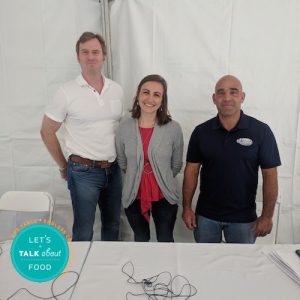 Sourcing Matters ep.
Sourcing Matters ep.  Throughout the 45 minute conversation Shauna shares some interesting anecdotes of situations that have arisen in her time at as VP at Annie’s, and most recently while managing the organic allotment of General Mills’ vast arsenal of products.
Throughout the 45 minute conversation Shauna shares some interesting anecdotes of situations that have arisen in her time at as VP at Annie’s, and most recently while managing the organic allotment of General Mills’ vast arsenal of products.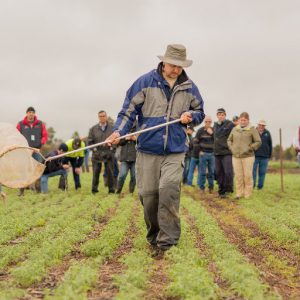 A whistleblower case was filled against the USDA – stating the actions of USDA leadership suppressed his voice; compromised his science. Penalized for these actions, Dr. Jonathan Lundgren was soon forced out of the USDA as retaliation against those scientific findings, and mostly for not backing down. For episode 35 you get to hear how this brave and honorable scientist is setting a path forward for a more just, prosperous and well informed tomorrow.
A whistleblower case was filled against the USDA – stating the actions of USDA leadership suppressed his voice; compromised his science. Penalized for these actions, Dr. Jonathan Lundgren was soon forced out of the USDA as retaliation against those scientific findings, and mostly for not backing down. For episode 35 you get to hear how this brave and honorable scientist is setting a path forward for a more just, prosperous and well informed tomorrow.